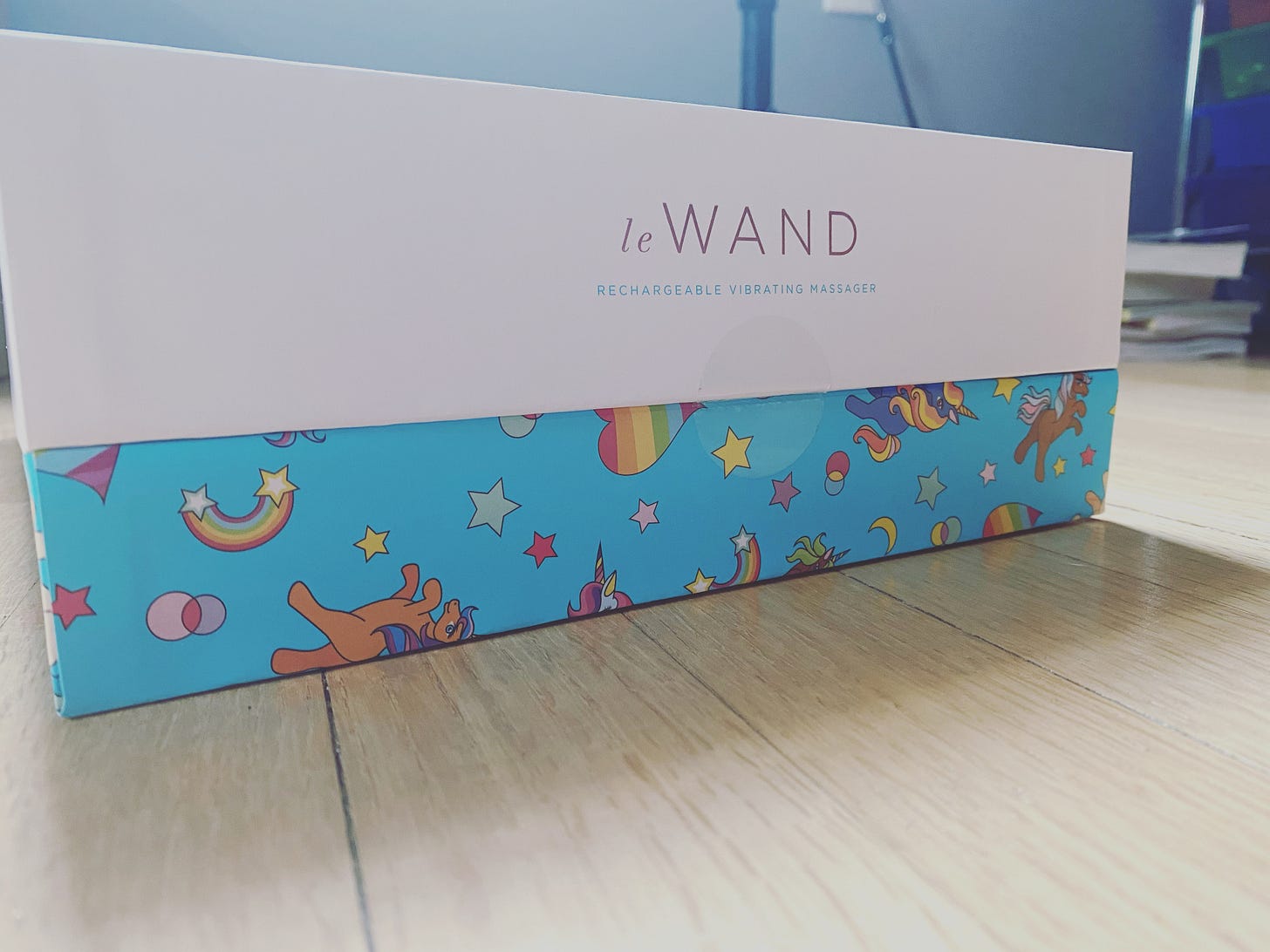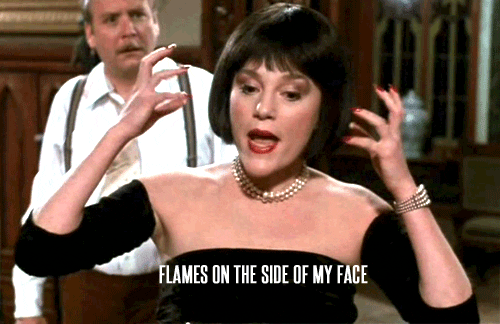How I Bumbled My Way Through a Conversation About Pleasure
May was Sex Ed for All month... but these are conversations we need to have all year 'round.
I don’t know why I thought my 7-year-old wouldn’t notice the box for my new Le Wand Unicorn Wand just because I’d placed it on the tippy-top of my bookcase. I mean, the word “WAND” was emblazoned across it in large type, above a vibrant illustration of stars, rainbows, and cavorting unicorns.
Also, that child misses nothing.
“Mommy,” she said, looking up at the top of my bookcase. “What’s that!?”
I glanced over to see what she was looking at. Oh, Christ almighty.
“Oh, don’t worry about it,” I said. “It’s a thing for work.”
And while, technically, I do sometimes write about sex toys for work, I was totally lying.
For shame.
“But… but… it says ‘wand,’ Mommy.”
Of course she’d notice that. Wands are the stuff of superhero princesses and fairy queens. Witches and wizards. All things she’s obsessed with.
“It’s an adult thing, sweet-sweets. Don’t worry about it.”
I was starting to sweat.
“But… but… but Mommy,” she said. “There are unicorns on it!”
If I could convey my emotions at that point using only an emoji, this would be it:
“It’s still for adults,” I insisted. “Adults can like unicorns, too.”
“But... but... but what is it??" she pressed.
“It has to do with sex,” I said. My daughter had already learned about sex, at its most basic level, and she knew that I wrote about it for a living. I figured this would be enough.
“JUST TELL ME WHAT IT IS, MOMMY!” she insisted, on her feet now, fists clenched. She stamped one foot for good measure.
My god. My child is relentless.
What followed was a not-perfect but still-not-the-worst conversation about a number of things.
“It's… a tool for sexual pleasure,” I said, unsure of where I should take this.
“But why do you need it if you're just writing about it?” she asked, my original lie coming back to bite me in the ass.
“I mean, I like to experience pleasure, too,” I snarked, lightly panicking now. But then I began to find my footing.
I explained that pleasure was something that made you feel good.
“What are some of the things that make you feel good?” I asked, and we talked about the things that bring us pleasure, like art and reading and embroidery and Twix ice cream bars.
Then I explained that sex was another thing folks did in order to experience pleasure. She’d already learned that sex could be part of the baby-making process, but now I explained that reproduction wasn’t its only function.
Then I explained that as people got older, some of them enjoyed using certain tools in order to enhance their pleasure, whether alone or with another person.
Once we got through all of that, she was satisfied.
Now, for many parents I know, a conversation like this one sounds terrifying. And their inclination might be to deflect (as I tried to do at first) or to lie or to just shut down their child’s line of questioning entirely.
But as I’m pretty sure I’ve mentioned in past emails, if a child feels compelled to ask a question, they’re ready for a real answer. You just need to figure out what they’re really asking, what they already know, and how much more they’re ready to hear.
Oftentimes, the reluctance to talk to one’s kids about sex comes from a place of fear. Parents worry that if they give their child too much knowledge, it’s tantamount to giving them permission to do ALL THE THINGS.
In recent months, especially, the conservative right has capitalized on this fear, spreading disinformation in service of sowing panic.
Just the other week, an educator-friend of mine found herself under direct fire when one of her workbook pages went viral. She was forced to withstand an onslaught of online vitriol, which prompted her to shut down her social media accounts. She even received an angry voicemail from someone who repeatedly called her a pervert, threatening both her and her husband.
She recorded a fantastic video in the aftermath, both about her experience and about why the work she does is so important.
I encourage you to set aside some time to watch her video.
But what it comes down to is the fact that arming our children with knowledge about their bodies is the very thing that keeps them safe.
It helps to protect them from sexual abuse. And as they get older, it helps them make smart and healthy decisions around sex and relationships.
May was Sex Ed for All Month. It was one of those months where I was supposed to really ramp up my advocacy around comprehensive and inclusive sex ed, giving you action steps like:
read one of these books with your child
or
talk to your local Board of Education about the curriculum they provide
or
pick up some tips from this rad discussion.
And yes. You should totally do those things.
But I want you to go beyond these one-time action steps. I want you to look for those opportunities that can lead naturally to conversations about your kiddo’s body and their boundaries and their relationships.
I want you to turn to your kid when they ask you about your menstrual cup or your pubic hair or your by-god vibrator and I want you to tell them the truth.
My One Ask, Though
I’ve mentioned in a past email that there has been an increase in attempted book bannings this past year, particularly in the areas of diversity, inclusion, and sexuality.
This enrages me.
I'm a book nerd, and a huge believer in the power of books to open our kids' eyes to new worlds and new concepts and new understandings of themselves and others.
Book bannings like the ones we’ve been seeing only succeed in keeping our kids in the dark, making invisible the experiences of those who don't fit the white, heterosexual, cisgender, able-bodied "norm."
I want my daughter to read banned books, and I want your kids to read them, too. The knowledge found in these books can help your kids make smarter, healthier decisions around their bodies and their relationships. These books can build empathy and understanding for those who may be different from them. They can help them see how diverse and beautiful humanity really is.
I and other Sex Education Alliance (SEA) members have put together a list of commonly banned books within the sex ed space.
I’ve read a bunch of them (and others) with my daughter, and they have given her basic knowledge about her body, and have helped her to grasp essential concepts like consent and privacy and boundaries. This foundational knowledge is necessary for the information still to come… information that will keep her safe and healthy and happy.
At SEA, we’re asking parents to share their own stories about the books that helped them when they were growing up, and the books they’re sharing with their children. It is our hope that sharing stories such as these will help push back against the disinformation campaign that’s spreading across our country, a campaign that paints knowledge as dangerous, rather than essential.
If you’d like to help us out, please fill out this form.
Full Disclosure: Sex Ed in the News
I linked up above to my Feminist Book Club piece on the rhetoric conservatives are using to promote their anti-LGBTQ+ agenda, but you can find further info on the topic in this article about the recent proliferation of homophobic legislation, this article on why sex ed and grooming are not the same, and this article on how conservative pundits are wrong about what does and does not keep our children safe.
If you’d like to dig even deeper into this, SIECUS has put together a great report on the recent attacks against kids, schools, and diversity.
For a glimpse at how these battles are playing out in my home state of New Jersey, here’s some of the push-back that’s occurring in the face of our new sex ed standards. The NJ Department of Education is having a virtual meeting on June 1, at which the public is welcome. Consider attending to show your support for New Jersey’s updated Student Learning Standards for Comprehensive Health and Physical Education.
And p.s. Conservatives say we’re sexualizing kids. Jessica Valenti calls bullshit.
And just for the LOLs, here are 31 tweets about parents attempting to have “the talk” with their kids.
This Month’s Sex Educator Spotlight
Over at the Guerrilla Sex Ed blog, I share an interview with Deborah Roffman, who recently released a new book: The Science of Babies. Click through to read about how folks are ignoring the needs of children, and how we can shift our thinking around conversations about human sexuality.
My Favorite New Sex Ed Resource
This 200 Words series is for those who feel at a disadvantage when speaking about a subject with which they’re unfamiliar. This book in particular focuses on the language of sexuality and gender, helping readers become well-versed in the vocabulary of everything from gender identity to gender expression to sexuality stigma and more.






